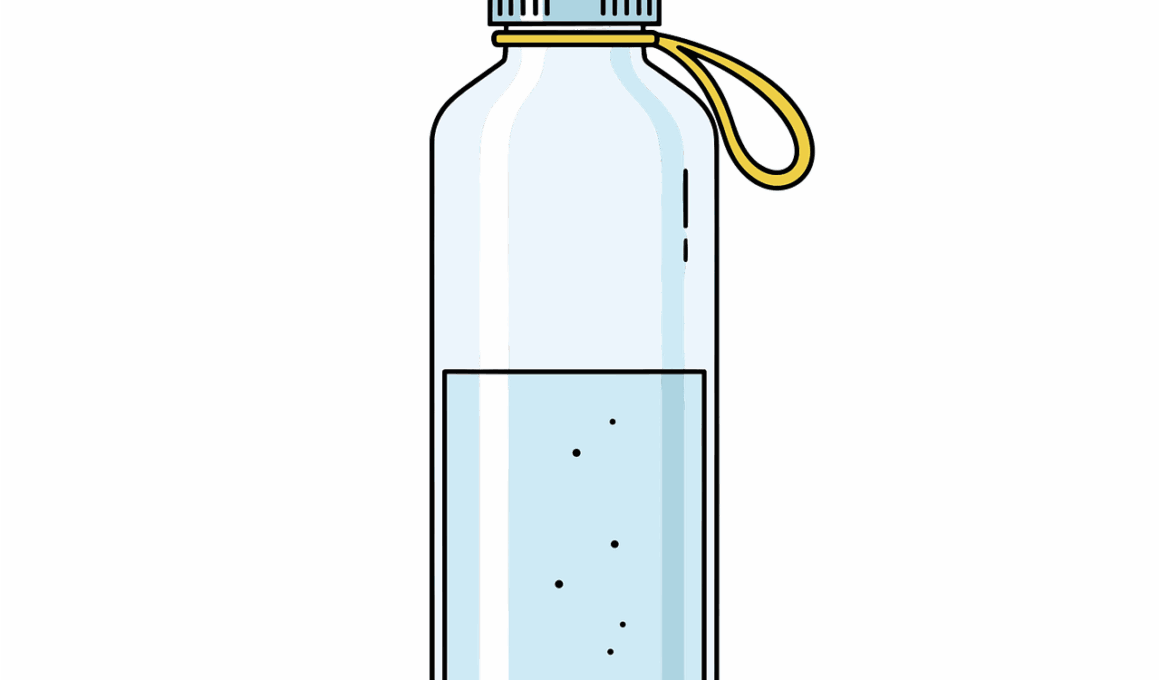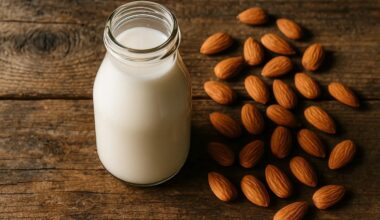Natural vs. Sports Drinks: What’s Best for Youth Hydration?
Proper hydration is critical for youth athletes engaging in sports and physical activities. Parents and coaches often debate whether natural drinks or sports drinks are the more effective choice for hydration. Natural drinks typically include water, coconut water, and fruit juices, which can be beneficial for hydration due to their natural sugars and electrolytes. In contrast, sports drinks contain added electrolytes, sugars, and sometimes flavors that are designed to replenish what is lost during exercise. Understanding the hydration needs of youth athletes is vital for optimal performance and health. Water is usually adequate for hydration in less intense activities, while sports drinks may be necessary for high-intensity or prolonged efforts exceeding an hour. However, it is essential to consider the caloric intake of children, as sugar-laden drinks can contribute to unwanted weight gain. Parents should analyze the situation based on the child’s age, activity level, and overall diet to ensure proper hydration strategies are employed during the youth athletic experience. Ultimately, establishing a balance based on individual needs can promote better hydration and performance in young athletes.
Natural drinks boast many advantages, including low-calorie options and essential nutrients from whole fruits. Coconut water is known for being rich in potassium and other electrolytes, making it a fantastic choice for hydration after sports. Additionally, water is always the best and most natural choice. The hydration efficiency in natural drinks can help restore lost fluids without excessive added sugars found in many commercial options. This makes natural drinks a healthier alternative for everyday consumption, especially for younger athletes who might not require the high sugar content found in sports drinks. Educating young athletes about the benefits of choosing natural drinks can help them make informed choices and develop lifelong healthy habits. It’s also a great way for parents to encourage hydration using simple and natural products rather than commercially branded options that may not be ideal for children. Ensuring that children enjoy hydration choices will promote adherence to their hydration practices. Moreover, the flavoring in natural drinks can be appealing and enjoyable for young athletes, further motivating them to hydrate adequately. Parents must also consider individual preferences when fueling their little athletes.
The Drawbacks of Sports Drinks
Sports drinks, while popular, have drawbacks, particularly for youth athletes. Many of these beverages contain higher sugar levels and over 100 calories per serving, contributing to increased energy intake. This calorie density can be concerning, especially for younger athletes who may not expend enough energy to justify these extra calories. Moreover, high-sugar drinks can lead to adverse health impacts, such as dental cavities and potential weight gain. These concerns become even more significant in less active youth workers who may not require the recovery and electrolytic benefits sports drinks provide. In some instances, excessive consumption of sports drinks results in a preference for sweet flavors and discouragement from enjoying plain water or healthier alternatives. Coaches and parents should emphasize moderation while teaching their young athletes the art of hydration. It’s crucial to balance sports drink consumption with natural options to promote health and well-being. Ultimately, understanding the effect of sugary sports drinks on overall health is essential to guide youth athletes toward healthier choices. Favoring a structured hydration plan that revolves around moderation will help combat the side effects of sugary drink variety.
Youth hydration strategies should be science-based and individualized, factoring in various elements that influence hydration needs. These include age, type of sport, climate conditions, and the intensity and duration of the activity. The goal is to ensure that young athletes are hydrating adequately, leading to improved performance and reduced fatigue. It’s essential to develop a pre-event hydration strategy to prepare for the activity ahead. Parents can assist by encouraging proper hydration in the hours or day leading up to competition. A good rule of thumb is to drink at least 16-20 ounces of fluid two hours before exercise and refill during and after the event. Constant access to water during practice sessions would also assist in maintaining hydration levels. Throughout training, athletes should establish habits that promote hydration awareness. Monitoring hydration state via check-ins can further enhance assessment practice, ensuring it is a priority. Technologies and learning tools can also aid practices as athletes become more aware of their hydration needs. This approach empowers youth athletes to take charge of their hydration, augmenting their performance and enjoyment throughout their athletic journey.
Recommendations for Parents and Coaches
Parents and coaches play pivotal roles in helping youth athletes recognize hydration needs and make healthy choices. It’s beneficial for adults to model good hydration behavior by prioritizing water consumption and choosing nutritious drinks in front of young athletes. Conducting workshops or educational sessions could further enhance understanding of proper hydration practices among youth. Providing a variety of hydrating options can engage kids and avoid monotony; infusing water with fruits like oranges, lemons, or berries may appeal, making hydration an enjoyable experience. Parents should monitor the quantity of sugars young athletes consume, aiming for balance and nutrient-dense options. It’s equally vital to empower young athletes through education. Discussing the effects of dehydration, fatigue, and optimizing sports performance can inspire them to take ownership. Additionally, coaches can integrate hydration education into their training regimens, ensuring that hydration is not an afterthought. These combined efforts will not only enhance hydration awareness for individual athletes but also promote a culture of hydration within teams. An open dialogue about hydration can improve practice habits and create lasting health benefits far beyond sports.
Proper hydration should not be taken lightly, especially in extreme weather. Adversities in temperature can affect hydration status, making it essential to adapt drinks based on seasonality. During hotter months, outdoor youth athletes require more frequent hydration breaks. Planning for specific strategies to replenish fluids becomes crucial in hot weather, where athletes may lose electrolytes through perspiration while on the field. Sports drinks may serve as a good choice here; however, again, moderation is vital. Conversely, colder weather also presents hydration needs, as fluids remain necessary despite cold temperatures. Parents and coaches must stress that hydration is a year-round necessity, regardless of the prevailing climate. Understanding hydration can also play a crucial role in preventing heat stress or heat-related illnesses during hot seasons. By addressing these environmental factors, athletes will be better prepared to maintain peak performance and comfort throughout their activities. Incorporating hydration techniques into routines can assist young athletes to thrive in various climates, fostering long-term positive behaviors that instill self-care for life. By being proactive about hydration practices now, youth can cultivate habits that will aid them in future athletic endeavors.
Final Thoughts and Conclusion
In conclusion, choosing the best drink for youth hydration is ultimately dependent on the individual and the context of their activities. Natural drinks are often better for day-to-day hydration, while sports drinks can provide the necessary recovery support for intense activity lasting longer than an hour. Parents and coaches should prioritize water as the primary source for hydration, using sports drinks selectively based on specific needs. Effectively educating young athletes on hydration significance will empower them to make good lifestyle choices throughout their athletic careers. By focusing on balanced hydration strategies, the entire youth athletic community can foster a culture of health within sports. Inherent in this strategy should be encouraging youth to listen to their bodies and respond appropriately. As young athletes begin to learn the importance of hydration, they create a solid foundation for longevity in sports participation and overall physical health. Ultimately, by emphasizing hydration education and addressing both needs and preferences, everyone involved can contribute to promising outcomes in youth athletics. The goal should always be healthy athletes who understand hydration’s crucial role in performance, aiding their continued participation and longevity in their respective sports.
Correct hydration directly influences athletic performance and overall well-being for young active children. It’s essential for coaches, parents, and athletes to understand the most effective hydration strategies, choosing between natural drinks and sports drinks. Water remains the best choice for all-around hydration, but it’s paramount to ensure young athletes are consuming adequate fluids before, during, and after exercise. Understanding the differences between natural and sports drinks will help individuals make informed choices that suit their health status and their athletic performance objectives. Coaches and parents must recognize that every young athlete’s needs are unique, encouraging personalized hydration strategies to optimize physical performance without compromising overall health and well-being. Consistent monitoring, coupled with a strong educational foundation regarding hydrating beverages and their effects, will empower youth athletes to build healthier habits, not just in sports but for a lifetime. As youth engage in athletics, fostering a culture of hydration awareness and education will help support their endeavors. Encouragement for healthy hydration practices should be woven into the fabric of youth sports programs, allowing every young athlete the opportunity to thrive athletically while optimizing their health.


